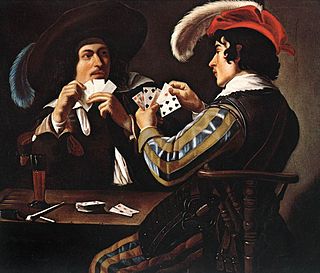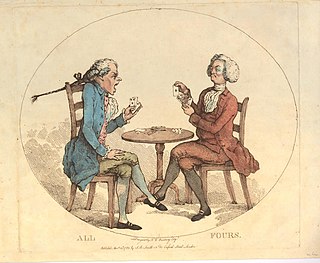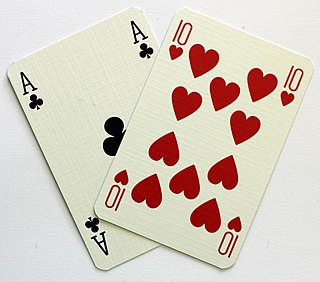
A card game is any game using playing cards as the primary device with which the game is played, be they traditional or game-specific. Countless card games exist, including families of related games. A small number of card games played with traditional decks have formally standardized rules with international tournaments being held, but most are folk games whose rules may vary by region, culture, location or from circle to circle.

Mahjong or mah-jongg is a tile-based game that was developed in the 19th century in China and has spread throughout the world since the early 20th century. It is played by four players. The game and its regional variants are widely played throughout East and Southeast Asia and have also become popular in Western countries. The game has also been adapted into a widespread online entertainment. Similar to the Western card game rummy, mahjong is a game of skill, strategy, and luck. To distinguish it from mahjong solitaire, it is sometimes referred to as mahjong rummy.

Oh Hell or Contract Whist is a trick-taking card game of British origin in which the object is to take exactly the number of tricks bid. It was first described by B. C. Westall around 1930 and originally called Oh! Well. It was said to have been introduced into America via the New York clubs in 1931. Phillips and Westall describe it as "one of the best round games."

Poker is a family of comparing card games in which players wager over which hand is best according to that specific game's rules. It is played worldwide, but in some places the rules may vary. While the earliest known form of the game was played with just 20 cards, today it is usually played with a standard deck, although in countries where short packs are common, it may be played with 32, 40 or 48 cards. Thus poker games vary in deck configuration, the number of cards in play, the number dealt face up or face down, and the number shared by all players, but all have rules that involve one or more rounds of betting.

A trick-taking game is a card or tile-based game in which play of a hand centers on a series of finite rounds or units of play, called tricks, which are each evaluated to determine a winner or taker of that trick. The object of such games then may be closely tied to the number of tricks taken, as in plain-trick games such as contract bridge, whist, and spades, or to the value of the cards contained in taken tricks, as in point-trick games such as pinochle, the tarot family, briscola, and most evasion games like hearts. Trick-and-draw games are trick-taking games in which the players can fill up their hands after each trick. In most variants, players are free to play any card into a trick in the first phase of the game, but must follow suit as soon as the stock is depleted. Trick-avoidance games like reversis or polignac are those in which the aim is to avoid taking some or all tricks.

Whist is a classic English trick-taking card game which was widely played in the 18th and 19th centuries. Although the rules are simple, there is scope for strategic play.

All Fours is a traditional English card game, once popular in pubs and taverns as well as among the gentry, that flourished as a gambling game until the end of the 19th century. It is a trick-taking card game that was originally designed for two players, but developed variants for more players. According to Charles Cotton, the game originated in Kent, but spread to the whole of England and eventually abroad. It is the eponymous and earliest recorded game of a family that flourished most in 19th century North America and whose progeny include Pitch, Pedro and Cinch, games that even competed with Poker and Euchre. Nowadays the original game is especially popular in Trinidad and Tobago, but regional variants have also survived in England. The game's "great mark of distinction" is that it gave the name 'Jack' to the card previously known as the Knave.

Euchre or eucre is a trick-taking card game commonly played in Australia, Canada, Great Britain, New Zealand, and the Midwestern United States. It is played with a deck of 24, 28, or 32 standard playing cards. There are normally four players, two on each team, although there are variations for two to nine players.
Ninety-nine is a card game for 2, 3, or 4 players. It is a trick-taking game that can use ordinary French-suited cards. Ninety-nine was created in 1967 by David Parlett; his goal was to have a good 3-player trick-taking game with simple rules yet great room for strategy.

Brag is an 18th century British card game, and the British national representative of the vying or "bluffing" family of gambling games. It is a descendant of the Elizabethan game of Primero and one of the several ancestors to poker, the modern version just varying in betting style and hand rankings. It has been described as the "longest-standing British representative of the Poker family."

Solo whist is the English form of Wiezen, a simple game of the Boston family played in the Low Countries. It is a trick-taking card game for four players in which players can bid to make eight tricks in trumps with any partner, or a solo contract playing against the other three players. Thus it combines both partnership and cut-throat play. Scoring is with small stakes won or paid out on each hand.

Cheat is a card game where the players aim to get rid of all of their cards. It is a game of deception, with cards being played face-down and players being permitted to lie about the cards they have played. A challenge is usually made by players calling out the name of the game, and the loser of a challenge has to pick up every card played so far. Cheat is classed as a party game. As with many card games, cheat has an oral tradition and so people are taught the game under different names.

Cassino, sometimes spelt Casino, is an English card game for two to four players using a standard, 52-card, French-suited pack. It is the only fishing game to have penetrated the English-speaking world. It is similar to the later Italian game of Scopa and is often said, without substantiation, to be of Italian origin. Cassino is still played today in Madeira, probably due to English influence.

Rummy is a group of games notable for similar gameplay based on matching cards of the same rank or sequence and same suit. The basic goal in any form of rummy is to build melds which can be either sets or runs and either be first to go out or to amass more points than the opposition.
Romanian whist is a variant of whist which is similar to the English or American game Oh Hell! It is currently popular in Romania, and there it is simply called "whist".
The best chess-player in Christendom may be little more than the best player of chess; but proficiency in whist implies capacity for success in all these more important undertakings where mind struggles with mind. Edgar Allan Poe
Catch the Ten, also called Scots Whist or Scotch Whist, is an 18th-century point-trick, Ace-Ten card game which is recorded as being played only in Scotland, although evidence suggests a possible German origin. Unlike standard Whist, it is played with a pack of only 36 cards, the 5s and below being omitted. In the trump suit, the Jack is the highest card. Despite its alternative name, it has nothing to do with standard Whist.

Dummy whist is one of many variants of the classic trick-taking card game Whist. The general rules of dummy whist are similar to that of bid whist, with two notable exceptions. Bid whist is played by four players, whereas dummy whist is played by only three. Secondly, instead of dealing a kitty, a dummy hand is dealt to be on the team of the player who wins the auction.

The following is a glossary of terms used in card games. Besides the terms listed here, there are thousands of common and uncommon slang terms. Terms in this glossary should not be game-specific, but apply to a wide range of card games played with non-proprietary packs. It should not include terms solely related to casino or banking games. For glossaries that relate primarily to one game or family of similar games, see Game-specific glossaries.
Court piece is a trick-taking card game similar to the card game whist in which eldest hand makes trumps after the first five cards have been dealt, and trick-play is typically stopped after one party has won seven tricks. A bonus is awarded if one party wins the first seven tricks, or even all tricks. The game is played by four players in two teams, but there are also adaptations for two or three players.

Pontoon, formerly called Vingt-Un, is a card game of the banking family for three to ten players and the "British domestic version of Twenty-One," a game first recorded in 17th-century Spain, but which spread to France, Germany and Britain in the late 18th century, and America during the early 19th century. It is neither a variant of nor derived from Blackjack. Both are descended from the early British version of Vingt-Un. In Britain, it first became known as Pontoon during the First World War, the name apparently being a soldier's corruption of its former French name. The game has no official rules and varies widely from place to place. It is a popular family game, but also widely played by children, students, and members of the armed forces. In 1981, Pontoon was the third most popular card game in Britain after Rummy and Whist. It has been described as "an amusing round game and one which anyone can learn in a few minutes."













